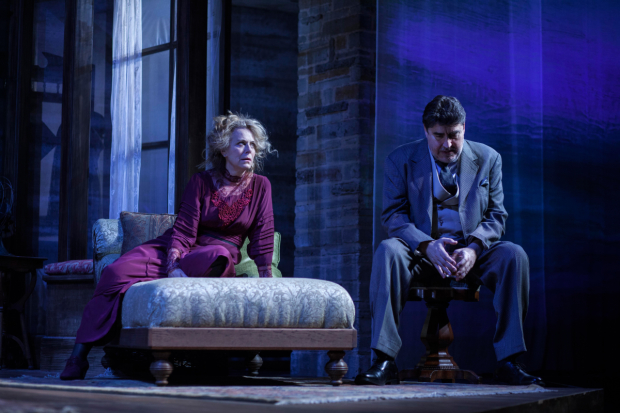Long Day's Journey Into Night
Anguish clouds the Tyrone summerhouse in this American classic.

(© Chris Whitaker)
Mary Tyrone is the female Hamlet. She's a role that measures an actress' stamina, talent, and resourcefulness. No wonder many top-echelon actresses such as Jessica Lange, Katharine Hepburn, and Vanessa Redgrave jump at the role. This time, it's Jane Kaczmarek who takes on the challenge of Long Day's Journey Into Night's tragic and heartbreaking Eugene O'Neill protagonist, a woman who is imprisoned by her addiction, and incapable of keeping her lost family together.
The Pulitzer Prize-winning drama, now running at the Geffen Playhouse, focuses on the Tyrone family during a sweltering summer day in 1912 Connecticut. The patriarch, James (Alfred Molina), was once a famous stage actor, but now wastes money on shady real-estate deals while always terrified of returning to the poorhouse. His wife, Mary (Kaczmarek), has once again hit rock bottom with a terrible morphine addiction. The eldest son, Jamie (Stephen Louis Grush), drinks and carouses around town bars and brothels to the displeasure of his father. The youngest, Edmund (Colin Woodell), suffers from consumption, a disease that killed his grandfather, and feels his own mortality. During an average day for the Tyrones, they argue, manipulate, and futilely attempt to keep their demons at bay.
Kaczmarek gives a physically draining performance. Her eyes bug out with her pupils darting about like they're desperate to run out of their sockets. Her Mary manically tries to appear normal and sober when she's crawling out of her own skin. When the effects of the drugs taper off and she crashes, she appears like a bag of bones held together with string. Her voice has an ethereal element. Every movement and word is devastating to witness, and the audience is as impotent to help as her family members are.
Molina is commanding as the has-been ham actor, telling his anecdotes for the thousandth time as though by rote, thrashing his family with admonishments then quickly retreating, ashamed of his own venom toward those he loves. Woodell is electrifying as Edmund. Hacking and weak, he still demands to be alive, striking back at his family for their selfishness when he is drowning. Grush takes on the tricky role of Jamie, a character brimming with whisky and self-loathing. Unfortunately, instead of capturing the audience's attention, Gush's version of Jamie comes off cranky, like the drunk uncle at your wedding that you'd wish would take a cab home. Angela Goethals, in the minor role of a servant, brings humor to her repressed confidant who lives vicariously through the dynamic family she serves.
For O'Neill's semiautobiographal play, director Jeanie Hackett has ghosts play a vital role in the text. The house, designed by Tom Buderwitz, is a beach-front property that should be a glorious summer home, but instead, it takes on the elements of a gothic haunted house: gossamer curtains blowing, the sound of the foghorn at night keeping Mary awake, the ceiling creaking as Mary creeps around the second floor, pacing, craving the drug. When Mary drags a flowing veil down the steps in the final scene, it looks like a foggy trail. All these stage elements give a visual and auditory sense of dread and a reminder that the house they live in is more like a prison.
Considered a leading work of American theatrical literature, Long Day's Journey Into Night is a taxing play. At almost three and a half hours, it is filled with despair and the inevitability of death. Luckily, the seasoned performances in this production keep the audience compelled by the family's distresses, which makes this Long Day a worthwhile journey.











